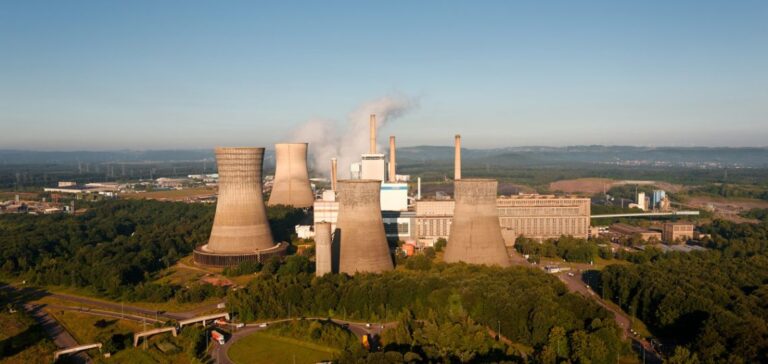The Émile-Huchet power plant in Saint-Avold, one of the last coal-fired plants in France, is at the center of a worrying political uncertainty. Last September, President Emmanuel Macron announced that all plants would be converted to biomass by 2027. However, this project, along with another for hydrogen production, seems to be stagnating due to blockages at Bercy.
The employees, represented by CFDT delegate Thomas About, expressed their frustration at the current lack of action. Videoconference meetings have been organized, but no concrete progress has been reported. The climate is gloomy among employees, many of whom have gone on vacation without any certainty about the future of the site.
Mobilizations and Union Reactions
Saint-Avold employees have stepped up their efforts to get the government’s attention. Demonstrations, high-profile visits by political figures such as Jordan Bardella (RN), Marine Tondelier (Les Ecologistes), and François-Xavier Bellamy (LR), as well as the blockade of the site last June, bear witness to their determination.
In mid-June, a schedule of tripartite meetings was drawn up at Bercy between government departments, the company and the social partners. However, no concrete timetable is currently in place, further fuelling uncertainty.
Future prospects and challenges
The uncertainty surrounding the formation of a new government is a major source of concern for employees. According to CFDT representative David George, it is unthinkable to wait until autumn for concrete progress, as this could compromise the plant’s future strategy.
GazelEnergie, the plant’s owner and a subsidiary of Czech businessman Daniel Kretinsky’s EPH Group, has given the company until the end of 2024 to define a clear strategy. In the absence of progress, the shareholder threatens to cut investments.
Reactions from the Ministry of Industry
The Ministry of Industry states that the government has been working for several months on the conversion of the Saint-Avold site, in collaboration with GazelEnergie and the employees. According to the Ministry, some industrial projects are still too immature, but nothing is blocked. A deadline has been set for the autumn in order to stabilize a comprehensive plan to ensure the site’s conversion and the continuity of employees’ activities.
The future of the Émile-Huchet plant now depends on the ability of political and economic players to find common ground quickly. The forthcoming formation of an “Association des travailleurs de la centrale Emile-Huchet” marks a new stage in the mobilization of employees for their future.
Current political uncertainty is jeopardizing the energy conversion of the Émile-Huchet power plant in Saint-Avold. The need for stability and new interlocutors at Bercy is crucial to unblock pending projects. The next few weeks will be decisive in defining a clear strategy and ensuring the long-term future of the site and its employees.






















